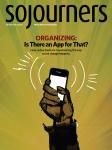HOW MANY POTENTIALLY helpful conversations get derailed by evoking reactions that have nothing to do with the issue at hand? Whether dealing with personal or cultural issues, we would do well to be aware of how we can unintentionally incite those with whom we want to build relationships.
Some readers may be old enough to remember the comedy duo Abbot and Costello. In one really funny bit, Lou Costello is locked in a jail cell with someone whose personal history evokes surprising explosions. His wife ran off with another man and ended up at Niagara Falls. So every time someone says, “Niagara Falls” the man relives the bad association and attacks the one who said the trigger phrase. “Niagara Falls!” the man shouts, “Slowly I turned, step by step I came to him, and I struck him ...” and at this point the man begins to beat on Costello until he regains his composure. But every time Costello forgets and says “Niagara Falls,” he gets another beating.
We live in a culture where perfectly normal words pull a trigger for misunderstanding and overreaction. In their objective sense, they are merely descriptive. But they have been redefined as terms of threats instead of just nouns or normal parts of reality.
“Socialism” becomes not just an economic system that is different from “capitalism”; it becomes a trigger word that represents a threat or an inaccurate description of any economic aid, and thus it provokes an attack. “Immigration” has become not just a part of our melting-pot history and an integral need for a healthy economy; it has now been turning into a red-flag word that evokes an image of evil outsiders trying to take what is “ours.” And interreligious cooperation (especially with Muslims) for the common good? Watch out!
Recently, our metropolitan area of Orlando put on an event to network different faith communities to “go green” for the preservation of the earth and ultimately to the benefit of the vulnerable. In materials for the event, which was sponsored by the city in cooperation with the EPA, my name appeared, without my knowing it, under a quote from the Quran. Indeed, I was so oblivious to the effect it would have on some evangelical pastors, I sent it around to my network. The response from several was like saying “Niagara Falls” to the crazy guy. I got accused of everything from turning my back on Christ to taking God out of the classroom! I am used to attack, but I am learning a lesson.
I do not believe any evangelical pastor would want to harm creation on purpose or the poor who depend upon it. And, of course, if I had designed the postcard the quote would have been from Genesis 2:15. But we all must be mindful of the atmosphere of immediate counterattack to perceived threats.
Can we ever get to the place where we can be reasonable, even charitable in our interpretations? I believe we can. But first you and I will need to remember to defuse a potential reaction by avoiding trigger words or phrases as much as possible. We can do that best not by being paranoid, but by using values we have in common with the suspicious. We need to use phrases such as “out of obedience to our scripture” and “not polluting” and “caring for the vulnerable who live off the land.” If our goal is cooperation for practical good, the ones who have the most charitable and commonly accepted terms will have to lead.
Dr. Joel C. Hunter is senior pastor of Northland Church in Orlando, Florida.

Got something to say about what you're reading? We value your feedback!